Here's what I think are the main points to be gleaned from all the upcoming verbiage:With these points said, it's probably not necessary for you to read the rest of what I wrote.
Personally I have always sought out newer music to listen to (new pieces, new composers, new styles, genres etc etc). This has been a kind of innate search throughout my life.
As I develop interest in new audible things my interest in old things wanes. (There are lots of exceptions to this, however.)
This process feels completely natural to me; it feels like growth. It feels like aging. I believe it is an essential element in why I'm a composer.
It also appears to be very unusual attitude among classical music listeners who, I sense, do not like to admit that their relationships with "masterpieces" change over time, except to decide which interpretation is now the best ever.
The Story Starts Here

In a previous post I mentioned anecdotally that I no longer listened to Mahler because I "grew up".
Part-time Mixed Meters Reader Addison (who is the anonymous part-time blogger behind Me And Yobo and a full-time New Yorker with whom I attended college years ago somewhere near cow pastures and who is also a fellow adherent of the Church of The Goon Show) responded succinctly to my terseness "That's Harsh".
And if Addison missed my admittedly elliptical point, I suspect my other two readers did as well.
So, allow me to go on at length about Gustav Mahler and my relationship to his music - because it represents a vast influence on my growth over the years - even though I no longer care to listen.

Sioux City Iowa
Okay, the story starts in Iowa where I grew up in a city famous for the world's largest popcorn and honey processing plants. Back then there was a several story high pile of cow manure near the Interstate Highway representing the bedrock principles of the local economy. Not a place for serious, challenging music.
My own musical tastes were initially influenced by my parents. Their record collection ran the gamut from late Mozart to Dvorak - plus the occasional Broadway musical.
Plus anything that might be played at a summer band concert - which I heard not on recording but at actual summer band concerts. In Sioux City these were held in a miniature reproduction of the Hollywood bowl. (The Grandview Park Bandshell - big enough to hold a 50-piece band.)

My Father played clarinet in that band - and as a toddler I'd be in the audience with my mother waving my arms like the conductor, a man named Leo Kucincski. Once, running backstage after the concert to see my Father, I tripped over a dachshund with disastrous effect (on me, the dog was fine).
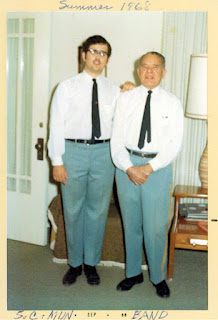
Hmmm - oh yeah - Mahler. Hang on, we're getting there.
As I reached my teen-age years, had I been the slightest bit a normal Iowa youth, I would have decided that this music was boring and succumbed to peer pressure, listening only to Herman's Hermits or the Dave Clark Five.
In the Library
Instead, having absorbed my parents entire collection, I searched on my own for more classical music. I discovered the modest record collection of the Sioux City Public Library - stone letters above the main entrance said "a gift from Andrew Carnegie". Let's blame him.
In the library I first encountered composers like Richard Strauss and Sergei Prokofief. Here I discovered a monaural copy of Leonard Bernstein conducting Mahler's Seventh. I'd never heard of Mahler, but the piece required two LP discs and it came in a thick black box instead of a simple record sleeve. How cool was that! I checked it out.
This was the mid-sixties. Mahler was having a revival. Not that his symphonies were readily available everywhere, let alone on the frontier between Nebraska and Iowa. In the important centers of Art and Intelligence (places like Chicago) he must have been performed and discussed. But all I knew about Gustav Mahler is what I could read in the liner notes to this album.
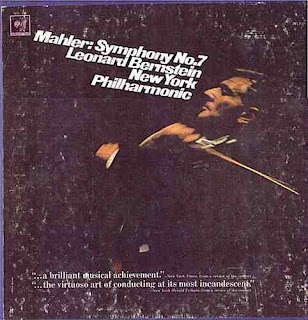
This is where the story really starts. Although I was trapped in Sioux City, I would come home after school and listen to music before my parents returned from work. In this environment I was captivated by Mahler's Seventh Symphony. Can you say "Bolt From the Blue". This piece is generally regarded as his most enigmatic. That's because it really is his most enigmatic. Not your recommended introduction to Mahler.
As a late-middle-age know-it-all with the advantage of hind-sight, I can tell you that in Mahler's music I encountered a person who didn't have all the answers and wasn't afraid to say so. I didn't know it then, but this was important.
Mahler's musical space encompassed conflict, irresolvable influences, indecision, uncertainty and finally inconclusive resolutions. Eventually I discovered that other creative artists dealt with such issues, but back then Mahler, for me, was a first faint glimpse into a universe I wanted to experience.
Not long after this I went away to college. That's where I met interesting people with similar interests for the first time. People like Addison whose offhand "That's Harsh" comment is responsible for this self-indulgent run-on essay. Let's blame him for this, okay?
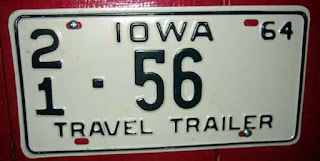
Going Away to College
Back then I put very great emphasis on the notion of "going away" to college. The Rabbi of our congregation had told me "Sioux City is a place you come from". I already knew that but I was simply flabbergasted that any adult would say it out loud. I wanted out. Going to college meant getting out.
Although the physical distance from Sioux City to Carleton College was only a few hundred miles, I found myself on a totally different planet (er, Planet Carleton?). There were still cows nearby, but no huge pile of shit. Plenty of other changes happened to me during this time period, of course, but for now I'm trying to stick with Mahler.

(And this is where the story really starts.) At Carleton I finally met other people who were interested in Mahler. We finally experienced all the symphonies. It was a really big deal when someone scored the first copy of a Mahler's Eighth recording - Solti conducting Chicago. We listened to each piece over and over. We traveled to the Cities to hear the Minnesota orchestra perform Mahler live listening raptly from the nosebleed seats of Northrop Auditorium. We were greatly offended by a tired principal trumpet player cracking too many high notes.
Each of our interests in Mahler certainly stemmed from different sources. Most meaningful to me were Mahler's Jewish/Christian and performer/composer conflicts. My friend had their own reasons although we didn't really know how to discuss them.
As a college senior I remember my roommate Mark Lindenbaum (now a doctor who still plays his tuba quite a lot) saying "The amazing thing about Mahler is that I feel like I really know him as a person." I couldn't disagree. Today knowing a composer's personality only through his music (accurately or not) still seems like a huge, remarkable accomplishment.
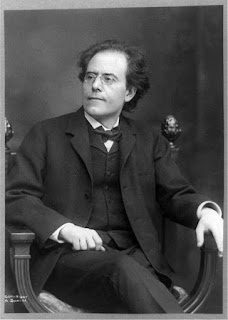
I'm not saying Gustav would have been an easy man to talk to, only that I would have some idea of what to expect when I met him. At the moment I can't think of another composer I could make that claim that about. I know a lot of music that just makes me wonder what kind of weirdo nebbish wrote it. (Yep, I do agree that my own music would fall into that hole.)
There were a number of Mahler highlights for me during my after school years. A broadcast by Leonard Bernstein explaining Mahler's Ninth as a different kind of farewell symphony. Ken Russell's film Mahler - okay, WAY over the top, but the soundtrack was a wild ride of bits and pieces of symphonic Mahler combined creatively. An early proto-mashup of Mahler.

But over all of this, I never lost my original fascination for the Seventh Symphony. I attended every Seventh performance that I could - including extending my stay in London in 1984 to hear the LSO.
The Enigmatic Ending
Something strange happened (and this, of course, is where the story really starts). It happened slowly mind you, but imagine the mid-90s. I lost my patience for all of Mahler's music. The comfort I used to find from his music was replaced by annoyance and discomfort. "Okay, I get it," I thought "What else is there to listen to?"
It seems rare to me for any fan of classical music to admit to changing tastes. I still respect and honor Mahler, but I don't care any longer for the experience itself. Much of the music in my parents collection, back in the 60s, is like that. I would never have a reason to ask to hear it. If life gives me Mahler I won't avoid the experience, I just won't seek it out.
Alas, the immediate cause of the "I grew up" anecdote was the upcoming LA Philharmonic performances of Mahler's Seventh in Disney Hall. I was speaking with the wife of the conductor of those concerts. Had I thought about it, I might have gone to hear the music in the Disney acoustic as the reviews were glowing. But I doubt I would have gotten caught up in the music itself.
So, Addison, babe - that's where I stand on the subject of Gustav Mahler's music. It was a flippant remark but grounded in truth. I hope you appreciate how much work your "That's Harsh" caused me in preparing this essay. Heck, I hope you read even half of it. Let's squeat lunch at Goodhue when you get the chance.

Postlude
And that's where the manuscript breaks off. I stopped work on this essay on February 22, 2007. I'm not going to try to expand on it now (July 8, 2007) although I made a few small edits. You get it pretty much just the way I left it.
There are a few errors. For example I have it on good authority they no longer serve meals at Goodhue. Mostly it brings up, in my mind, all sorts of avenues and alleys about who I am, where I came from, why I do what I do, like what I like, and create what I create.
Sometimes it's useful to strip off the clothing of nowness, dive into the pool of back-thenness, and search around for anything in need of rescuing. I did listen to several Mahler symphonies to make sure I haven't grown even more of late to the point that I need Mahler again. I don't appear to have done that. Maybe someday. I hope I live long enough to find out. Sigh.
Mahler and Me and Iowa Tags: Gustav Mahler. . . Sioux City Iowa. . . Carleton College. . . Me and Yobo. . . classical music. . . growing up. . . Mahler symphonies. . . David Ocker
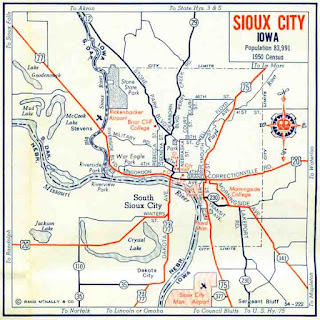
Most of the pictures will enlarge if you click them.
The Sioux City Stockyards Photo comes from here.
The Grandview Park Bandshell picture came from here. There used to be many, many more benches.
The picture of Goodhue (plus other Carleton campus pictures) came from here. You must imagine this during a Minnesota winter.
The still shot of the Nazi Girl on the Cross from Ken Russell's Mahler was found here.
Here's a fascinating article Mahler and the Crisis of Jewish Identity by Francesca Knapp and Raymond Draughon

7 comments :
David --
I don't want to be too analytical, but I'm struck by the possibility that the initial excitement of Mahler's music -- especially his way of evoking, if not creating, an entire world -- became less immediate to you as the (autobiographical) specificity of Mahler's references and styles became increasingly distant from your own. You appreciate his music, but the more familiar it becomes, the less close you are to it.
That said, isn't there something of the Mahlerian method in your blogging here, especially in the way that you integrate images into your storytelling?
And I went with The Dave Clark Five, maybe because Mahler was my father's favorite. I kind of found its florid emotionality impenetrable. But lately I have taken to Mahler a bit more. As one who is (almost solely) concerned with film music and the control of emotional expectation and delivery, I find Mahler's work a textbook. And occasionally I catch myself being moved (how humiliatin'). But much music I knew and loved in my youth, doesn't have to be relistened to, it is installed in a mental jukebox so that all I have to hear is a couple of notes and the rest of the piece is experienced immediately, as if condensed to a musical black hole. Then I find it almost aggravating to have to listen to the whole thing out in real time. Perhaps that is what you are experiencing?
Kudos to your friend who made the comment "That's harsh!" He must be a true friend, because I mostly want to take you out behind the barn with a shovel.
I find that Mahler's symphonies have become MORE relevant in my life as I grow older, not less. Mahler's insights into himself and the world become more amazing as time goes on, and I stumble on these insights myself.
If you think you "grew past" Mahler, you've become an arrogant and self-centered individual, that's for damn sure.
Hey! Is there a bit of a resemblance between ol' Mahler and a certain new chair at UCLA? Just thinking.... mmmm...
Daniel - I don't really understand how my pictures reflect Mahlerian methodology. Can you explain that?
Peter - it really is okay to be moved by music. There are a couple stories here on Mixed Meters about me weeping most unexpectedly at concerts.
Brian - my response to you is here. My wife Leslie thinks I was way too hard on you and she said she's never seen me react to anything in that manner. I guess you pushed the right button. Good shot.
Peter - I'm not sure if Gustav looks anything like that UCLA chair - both handsome devils, though, I expect. I was hoping Mr. UCLA chair would leave a comment about the homoerotic cookies.
David --
At a certain distance, all Mahler's music is is a series of audio snapshots from his own, very local, biography. He doesn't hesitate to include the banal, and often does, right next to the sublime. I think that you would agree that your blog and your photos here are both uniquely autobiographical and local and uniquely balanced between the banal and the sublime.
I'm fond of Mahler's music, but despite 18 years in either Germany or Hungary (where Mahler's presence in the opera house is still revered), I haven't come any closer to it -- it's like looking into someone else's photo album, for which I have increasingly little patience, and find that it often creates a sense of false intimacy. The music of Ives, on the other hand, gets closer to me all the time, even though his world and his musical references seem to move ever faster into the past (when was the last time a grade school chorus sang "Columbia the Jem of the Ocean"?). It could be that my Ives attachment is a sentimental ex patriot thing, and I probably project a great deal into my imagination of Ives as a character, but I'm still considerably more comfortable with that character and that psychology than with Mahler's.
Thanks Daniel for patiently explaining your comparison of my "blogging method" to Mahler. I do understand now.
At some point early in Mixed Meters I decided that my attempts at creativity ought to use locally found source materials if possible, most obviously the pictures. One doesn't have to go far back in music history to find useful precedents, certainly not as far as Mahler. Often no farther than a local club or gallery.
I really like your descriptive critical phrase "uniquely balanced between the banal and the sublime". I've added it to the Red Header list (with you credited as author.)
(It's probably obvious that the Red Header is the random non-sequitur which appears right below "Life Is Too Short...". A huge percentage of those sayings are found objects themselves.)
Ives' music never spoke to me anywhere near as strongly as Mahler's once did. But his career (as a maverick) is a better model for me than Mahler's, especially since several of the composers I work for have achieved Mahlerian levels of success and I have no problem not competing with that.
Post a Comment